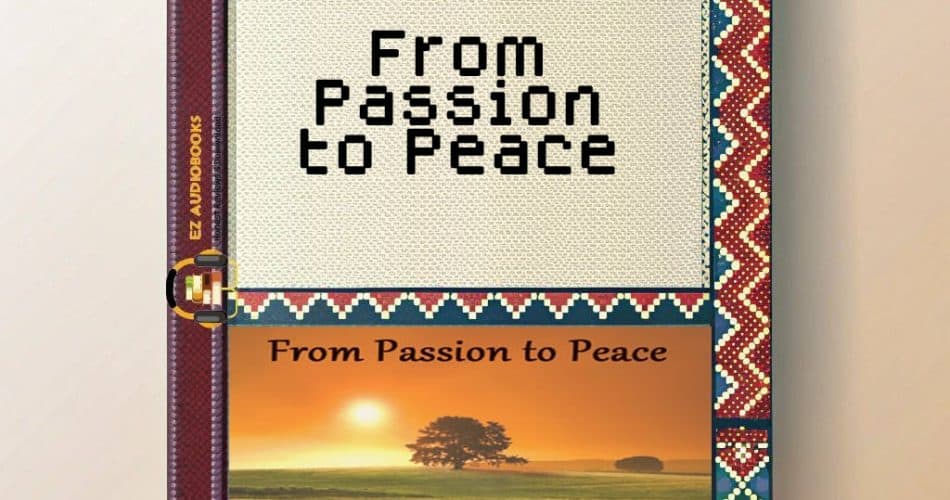Audiobook Sample
Listen to the sample to experience the story.
Please wait while we verify your browser...
- Title: From Passion to Peace
- Author: James Allen
- Narrator: Andrea Fiore
- Length: 01:03:49
- Version: Abridged
- Release Date: 01/01/2015
- Publisher: LibriVox
- Genre: Self Development, Health & Wellness
- ISBN13: SABLIB9788697
What fascinates me most about James Allen’s “From Passion to Peace” is its quiet audacity – a slim volume that dares to chart the tumultuous journey from human frailty to divine serenity. As I settled into the audiobook experience, narrated by Andrea Fiore and freely available through LibriVox, I found myself drawn into a contemplative space that felt both timeless and deeply personal. Published in 1901 yet resonating with today’s self-development ethos, Allen’s work unfolds in seven meditative segments: Passion, Aspiration, Temptation, Transmutation, Transcendence, Beatitude, and Peace. Each part serves as a stepping stone, an alchemic process that bridges the chaotic human condition with a state of enlightened calm. For someone like me, steeped in the analysis of cross-cultural narratives, this structure evokes the universal quest for meaning – a theme I’ve traced from Murakami’s surreal landscapes to Victorian moral treatises.
This audiobook came to me at a poignant moment. I recall a rainy afternoon during my year as a visiting professor in Tokyo, sitting by a window with Haruki Murakami’s “Kafka on the Shore” in hand. The interplay of English and Japanese editions revealed how language shapes not just meaning but emotional texture. Listening to “From Passion to Peace”, I experienced a similar revelation. Andrea Fiore’s narration – clear, measured, and imbued with a gentle gravitas – lends Allen’s prose a meditative rhythm that mirrors the text’s intent. Her voice becomes the steady guide through the storm of Passion and the quiet dawn of Peace, making this free audiobook a gift for anyone seeking solace in sound.
Through a cultural lens, Allen’s work feels like a dialogue between Eastern philosophy and Western introspection. His assertion that discipline and renunciation are mere tools – not the end goal – echoes Buddhist teachings on detachment, yet his prose carries the earnestness of a Victorian sage. The central theme of transmutation, the pivot between human struggle and divine clarity, is where Allen’s genius shines. He writes, ‘The Divine Life is established in that Perfect Knowledge which bestows Perfect Peace,’ a line that lingered in my mind long after Fiore’s voice faded. It’s a reminder of the alchemical potential within us all, a concept I explored with my Berkeley students when we dissected “Cloud Atlas” across its print, digital, and audio forms. The audiobook medium, we concluded, amplifies introspection – something “From Passion to Peace” achieves effortlessly.
Fiore’s performance is a cornerstone of this listening experience. Her pacing respects the weight of Allen’s ideas, allowing pauses that invite reflection without dragging the 64-minute runtime. The audio quality, crisp and unadorned as befits a LibriVox production, enhances the text’s simplicity. Yet, I found myself wishing for a touch more dynamism in the early sections – Passion and Temptation could have carried a fiercer edge to contrast the serenity of Beatitude and Peace. Still, her consistency ensures that the audiobook remains accessible, a quality vital for a work in the Self Development and Health & Wellness genres.
Allen’s text isn’t without its limitations. Its Victorian roots occasionally surface in a moralizing tone that might feel prescriptive to modern listeners accustomed to nuanced self-help narratives. The brevity – while a strength for focus – leaves little room to explore the practical application of his insights. How does one enact this transmutation amidst the chaos of 2025? I pondered this as I listened, imagining a companion piece blending Allen’s wisdom with today’s mindfulness practices. Yet, these critiques only deepen my appreciation for what the work achieves: a distilled meditation on inner transformation, made vivid through Fiore’s narration.
Compared to similar works, “From Passion to Peace” holds its own against Allen’s better-known “As a Man Thinketh”. Where the latter focuses on thought as destiny, this audiobook explores the emotional and spiritual arc – a subtler, more poetic endeavor. It also shares kinship with Thomas à Kempis’s “The Imitation of Christ”, though Allen’s secular lens broadens its appeal. For those drawn to self-development classics, this free audiobook offers a concise yet profound alternative.
I recommend this listening experience to anyone craving a moment of stillness – students of philosophy, seekers of wellness, or simply those intrigued by the evolution of audiobook storytelling. Its free availability on platforms like LibriVox or Audiobooks.com removes any barrier to entry, a democratizing gift in our digital age. As I reflect on this journey from passion to peace, I’m reminded of a quiet evening in my Berkeley seminar room, the hum of discussion fading as we listened to “Cloud Atlas”’s layered voices. Allen and Fiore offer a similar invitation: to pause, to listen, and to transform.
With literary appreciation and a nod to inner peace,
Prof. Emily Chen

